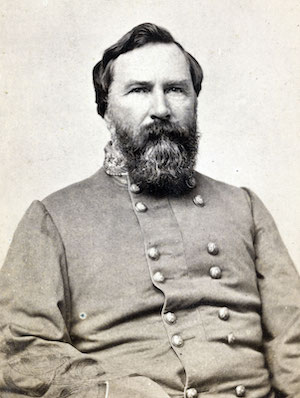James Longstreet
- JOHN JANARO
For these efforts he was vilified, socially isolated, and labeled a "traitor" by many former friends and acquaintances.
 James Longstreet
James Longstreet1821-1904
Slavery and racism were so firmly established when the United States of America became independent that the former was only eradicated by a fratricidal civil war and the latter remains a source of concern to this day, even as the ideal of political freedom that first found distinctive expression in 1776 continues to inspire the world.
This ambivalence and division between ideals and concrete practice made the U.S. a complicated society full of internal tensions and confused loyalties in the early-to-mid-19th century. This complexity provides the context that enables us to appreciate the significance of a simple but controversial man. James Longstreet is mostly known as the American Civil War general who was Robert E. Lee's right-hand man in many campaigns, and whose role in the Battle of Gettysburg is still disputed. James Longstreet the person is often lost in these disputations. He was a man of great integrity, with a simple dedication to doing his duty as a soldier: to serving God, following what he honestly believed to be the legitimately constituted authority of his country, and defending the common good.
James Longstreet was born in 1821 in the Piedmont region on the border between Georgia and South Carolina. Sponsored by the State of Alabama, he left home at age seventeen for the National Army Academy at West Point, where he did poorly in academics but excelled in matters of practical intelligence. He became an officer in the U.S. Army in 1842, serving with distinction in the Mexican War and then for over a decade on frontier posts in the Southwest. He was thus a veteran army officer when Alabama seceded from the Union (along with other southern states) and summoned him to its service. Like many others at the time, Longstreet assumed his primary obligation was to his state, and therefore he resigned his commission and joined the Confederate forces, with which he fought his most famous battles.
It was there in New Orleans that Longstreet began to wonder if there was a more universal, more inclusive way to serve Jesus Christ.
After the Southern defeat, Longstreet accepted the terms of his parole, moved to New Orleans, and dedicated himself to working for a unified country. For him it was a simple continuation of his dedication to his duty, but it stirred up considerable controversy among his fellow Southerners. He became one of the only former Confederate generals to support Reconstruction and join the Republican Party. Eventually, he was given command of the local militia whose members were mostly black, and he led them in the defense of the governor's mansion against a paramilitary group called the "White League."
For these efforts he was vilified, socially isolated, and labeled a "traitor" by many former friends and acquaintances. When he attended Sunday services at his Episcopalian church, he was spurned by the congregants, and the pews surrounding him were empty. It seemed that the spirit of divisiveness and resentment was prevailing even over the worship of God.
It was there in New Orleans that Longstreet began to wonder if there was a more universal, more inclusive way to serve Jesus Christ. Father Abram J. Ryan — a pastor in nearby Mobile, Alabama — assured him that the Catholic Church would welcome him with open arms. A path opened up, and the Jesuits of New Orleans came to accompany the old general and show him the way. After attending a thorough and intense mission given by Jesuit Father Arnold Damen, Longstreet became convinced that his duty was to follow Jesus fully in the Catholic Church, which received him in March 1877. He remained a faithful and devout Catholic for the last quarter-century of his life.
 This is Meaghen Gonzalez, Editor of CERC. I hope you appreciated this piece. We curate these articles especially for believers like you.
This is Meaghen Gonzalez, Editor of CERC. I hope you appreciated this piece. We curate these articles especially for believers like you.
Please show your appreciation by making a $3 donation. CERC is entirely reader supported.

Acknowledgement
 John Janaro. "James Longstreet." Magnificat (2021).
John Janaro. "James Longstreet." Magnificat (2021).
Reprinted with permission of Magnificat.
The Author

 John Janaro is Associate Professor Emeritus of Theology at Christendom College. He is a Catholic theologian, and a writer, researcher, and lecturer on issues in religion and culture. He is the author of Never Give Up: My Life and God's Mercy and The Created Person and the Mystery of God: The Significance of Religion in Human Life. He is married to Eileen Janaro and has five children.
John Janaro is Associate Professor Emeritus of Theology at Christendom College. He is a Catholic theologian, and a writer, researcher, and lecturer on issues in religion and culture. He is the author of Never Give Up: My Life and God's Mercy and The Created Person and the Mystery of God: The Significance of Religion in Human Life. He is married to Eileen Janaro and has five children.




